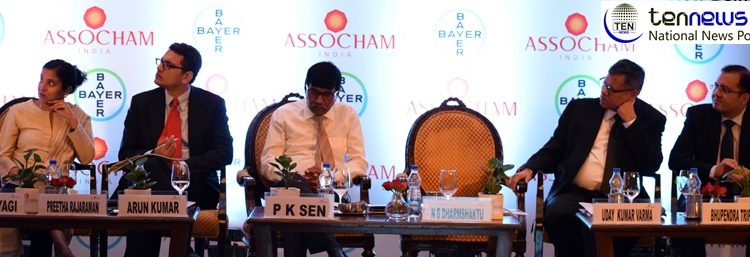ASSOCHAM Organises National Dialogue on ‘Protecting Communities: Vector Control in Action’
Prerit Chauhan (Photo/Video) By Lokesh Goswami Ten News Delhi :

New Delhi: The ASSOCHAM India and BAYER hosted National Dialogue on “Protecting Communities: Vector Control in Action” at The Leela Palace, New Delhi. The National Dialogue brought together key stakeholders (National programme managers, innovators, technical experts, policy makers, Global agencies, Innovation institutions, and funding agencies) to initiate a dialogue on Public Health with a focus on Vector Control, smart cities and public private partnerships.
Various eminent personalities including Uday Kumar Varma, Secretary General ASSOCHAM; Matloob Hasan, Director Azoth Analytics Private Limited; Dr. Arun Kumar, Head of South Asia, Bayer Environmental science; Dr. Preetha Rajarama, U.S Health Attache, India & Regional Representatives – South Asia, were present on the occasion.
In her special address, Dr. Preetha Rajarama, U.S Health Attache, India & Regional Representatives – South Asia, said,
“Vector Borne Diseases (VBDs) pose a significant risk to India due to rapid urbanization, increased movement of people and goods & environmental changes. These diseases impede economic development through direct medical costs and indirect costs such as loss of productivity, in addition to enormous mortality. All the common VBDs are preventable and Vector
Control along with community education can play a significant role in disease prevention.”
Bhupendra Tripathi County Lead Routine Immunization & Neglected Tropical Programme (NVBDCP) MoHFW, Govt. of India, said,
“Vector-borne diseases pose a major public health problem around the world. Globally, more than 347 million cases of vector-borne diseases including Malaria, Dengue, Chikungunya, Kala-azar, Japanese Encephalitis, Lymphatic Filariasis and Zika, were reported in the year 2017. Therefore, diminishing the” impact is a worldwide priority.”
Speaking on the occasion, Dr. P K Sen, Director, National Vector Borne Disease Control Programme, MoHFW, Govt of India, said,
“Early and accurate diagnosis of vector-borne diseases is one of the major factors in reducing the mortatity rates. Moreover, clinical case management, incorporating prompt and appropriate treatments that are effective, safe as well as affordable, remains a cornerstone of the national strategic plan for several of VBDs in India. Rapid Diagnostic Kits are playing a significant role in the diagnosis and case management.”
Dr. N. S Dharmshaktu, Principal Advisor on Public Health to MoH&FW, Directorate General Of Health Services Government of India, Delivering Key Note Address, said,
“To ensure widespread adoption, vector management measures must be actively advocated and communicated. Synchronizing advocacy and communication with policy makers, donors, test developers, technical partners, research agencies and disease control programmes can offer assistance in appropriate planning. Community needs to be involved in the task of elimination of mosquito breeding in and around their houses for keeping them free of larval breeding and reduction and elimination of adult mosquitoes.”

